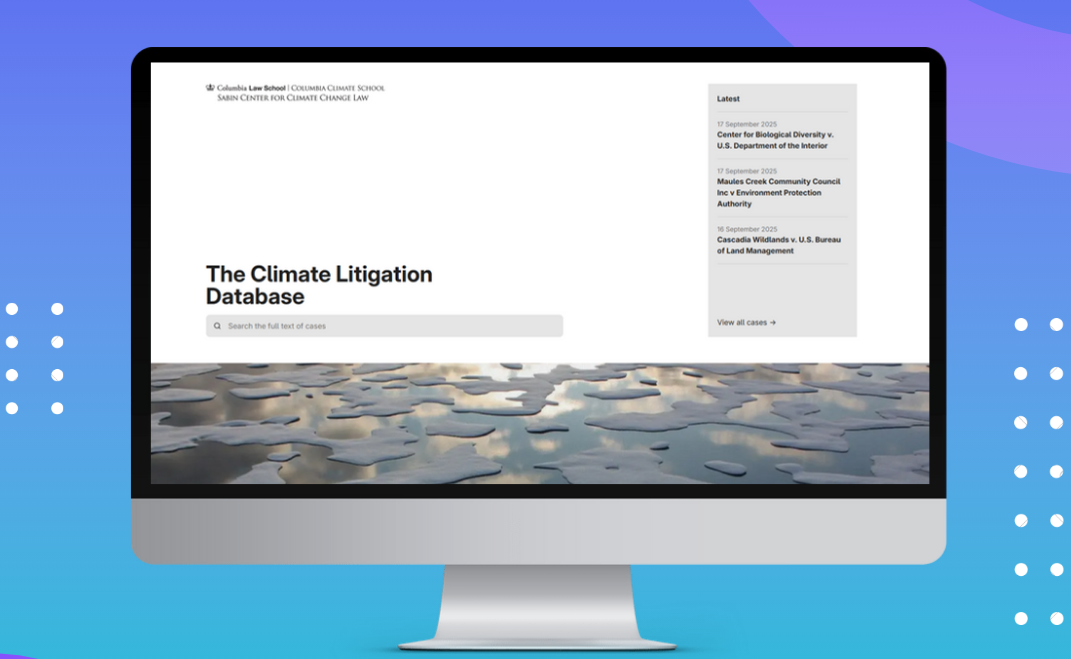The Sabin Center and Climate Policy Radar Relaunch The Climate Litigation Database
Tracking the Law in a New Era
Yesterday Columbia Law School’s Sabin Center for Climate Change Law relaunched The Climate Litigation Database in partnership with Climate Policy Radar (CPR). Powered by state of the art, AI-driven technology developed by Climate Policy Radar, the new platform builds upon the formerly separate U.S. and Global litigation databases. More than 3,000 climate change litigation cases and over 15,000 case documents are instantly accessible online and can be searched and analyzed using advanced machine learning and natural language processing tools.
For more than 15 years, the Sabin Center has tracked climate litigation through the U.S. and Global databases, which Sabin Center founder and faculty director Michael Gerrard first created in 2007. These resources have become the backbone of research, advocacy, and policymaking in the field—cited by scholars in leading journals, relied on by practitioners and NGOs in litigation strategies, used in courtrooms, and referenced by journalists, policymakers, and international organizations alike. They have helped users map trends, assess risks, and understand the evolving role of courts in addressing the climate crisis. Today, those databases come together as a single, unified platform. This is not a new product but a renewed commitment: the same reliability, scope, and rigor that users trust—now paired with new tools that make the data more powerful and accessible.
These new tools include:
- Text search in documents
Users will be able to search inside the case documents themselves, finding the exact arguments, quotes, or keywords they need.
- Cross-language search
Foreign-language case documents can now be searched in English, with results displayed in English as well.
- Integration of U.S. and Global Climate Litigation Databases
Users can search across all jurisdictions (including the U.S.) in a single query. Future developments will further integrate the formerly separate databases.
- Geography profiles
Users can filter by country or subdivision and get a clear picture of what’s happening in each geography. Initially only a limited number of subdivisions are available, including U.S. states and territories. More subdivisions will be added in the future.
- Downloadable data
Downloads will be available for every search or the full climate litigation database. Every download comes enriched with the Sabin Center’s metadata, labels, and summaries, making it ready for deeper analysis.
Together, this combination of the Sabin Center’s legal expertise and CPR’s technology ensures that litigation data is not only comprehensive but also accessible to everyone, from practitioners, to scholars, to policymakers.
"The Sabin Center's Climate Litigation Database has helped shape the field for more than 15 years. Now, powered by Climate Policy Radar's tech, it is more searchable and more usable, with enhanced functionalities that allow litigators, policymakers and researchers to go deeper and do more as they seek to understand climate cases around the world, " said Michael Burger, Executive Director of the Sabin Center.
By relaunching The Climate Litigation Database, we are ensuring that this rapidly expanding field can be tracked, analyzed, and understood with precision. It is not simply a research tool: it is a mirror of how societies worldwide are using the law to respond to the climate crisis.
Explore The Climate Litigation Database here, where you also can see answers to frequently asked questions, read about our methodology, and learn about our partners in this work. You can stay connected by subscribing to the Sabin Center’s Climate Litigation Newsletter to receive the latest updates. You can also register for an October 8 webinar that will include a demonstration of the platform's capabilities and a discussion of its relevance and significance for practitioners, academics, journalists, and other users.
"The Sabin Center's Climate Litigation Database has helped shape the field for more than 15 years. Now, powered by Climate Policy Radar's tech, it is more searchable and more usable, with enhanced functionalities that allow litigators, policymakers and researchers to go deeper and do more as they seek to understand climate cases around the world."
